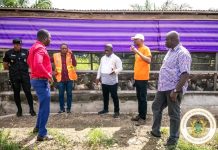The Department of Gender in the Volta Region, in collaboration with the Volta Region Coordinating Council (VRCC) and the United Nations Population Fund (UNFPA), has trained members of the Community Parent Advocacy Support Group (COPASGS) on sexual education and effective parenting that would help reduce teenage pregnancy.
The 50 participants, who were drawn from North and South Dayi and Afadzto South Districts, were taken through sex education, gender roles, and the duties of parents in bringing up their wards in a manner that would make them grow up to become responsible adults, particularly the girl child, without becoming pregnant along the way as she developed into adulthood.
Addressing the participants at Kpeve, the South Dayi District capita, the Volta Regional Director of the Department of Gender, Mrs. Thywill Eyra Kpe, emphasised on the need for parents to develop good relationships between them and their children to enable them direct and offer advice that would prevent the girls from becoming pregnant, and joining bad groups on the part of the boys.
Mrs. Kpe noted that most parents had failed in performing their duties and found it difficult to provide their children with sex education, as they were unable to mention the words vagina and penis, adding that those children would learn about the reproductive organs wrongly from their peers and would be misled, which would result in teenage pregnancy.
She disclosed that the Volta Region recorded 6,200 teenage pregnancy cases in 2021, and most of the blame was put on the inability of parents to effectively bring their children up to become responsible adults.
A Resource Person and Volta Regional Director of the Department of Social Welfare, Mrs. Stella Agbezuhlor Mawutor, said there were simple strategies that parents could adopt in training their children, including being vigilant and caring, which would eventually make them adopt a more affectionate relationship.
Mrs. Mawutor noted that it would enable parents to easily impart knowledge to their children on sex education, and the children would equally feel more comfortable in providing information on their sexual life, which would go a long way to reduce teenage pregnancy cases.
The South Dayi District Public Health Nurse, Ms. Sena Fiagbenya, announced that between January and March this year, out of every 100 pregnant women, 15 were children, and three girls between 10 to 14 years were pregnant, while 76 girls between the ages of 15 to 19 also became pregnant during the same period.









